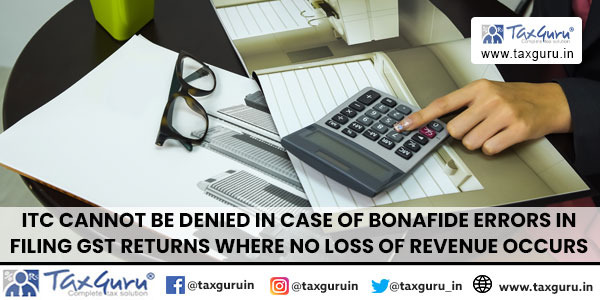The recent verdict by the Hon’ble Bombay High Court in the case of NRB Bearings Ltd. v. Commissioner of State Tax [Writ Petition No. 10771 of 2023 dated February 14, 2024] has significant implications for businesses navigating the complexities of GST compliance. The court’s decision reaffirms the rights of taxpayers to rectify errors in GST returns, particularly in cases where no loss of revenue is incurred. Let’s delve into the details of the case, its analysis, and the broader implications for taxpayers. Bombay High Court in this case allowed the petition while permitting the Assessee to rectify FORM GSTR-1 and held that in cases of bonafide errors in filing returns where no loss of revenue occurs, the technicalities should not prevent rectification.
Facts:
NRB Bearings Ltd. (“the Petitioner”) approached the Jurisdictional Officer (“the Respondent 1”) to allow the Petitioner to amend the invoice details pertaining to the Financial Year 2017-18 in FORM GSTR-1 for the month of December, 2019.
During the pendency of the said application, the Petitioner received confirmation from the job workers that they have not availed Input Tax Credit (“ITC”). On January 06, 2022, an application was filed before the Central Jurisdictional Commissionerate in relation to the disallowance of credit to M/s Balaji Auto Ltd. (“the Respondent-2”) on account of the mismatch between FORM GSTR-3B and FORM GSTR-2A. It was stated that by communication received by the Petitioner on January 27, 2022, the Respondent-2 had informed the Petitioner that no proceedings could be initiated against the Respondent-2, in this regard as no communication was received from the State Jurisdictional Commissionerate.
The Petitioner also referred to the guidelines which were issued by the State of Maharashtra in its Circular No. 02A of 2022 dated February 05, 2022 on the issues arising from ITC claims, in pursuance of which, it was contended that on May 09, 2022, the Petitioner obtained a certificate from its Chartered Accountant, certifying that the Petitioner had duly discharged GST on the transaction in dispute. The said certificate was stated to be shared by the Petitioner with the Respondent-2 on August 23, 2022. However, no response was received.
Hence, aggrieved by the circumstances, the Petitioner has filed the present wit petition.

Issue:
Whether ITC can be denied on bonafide errors in filing returns where no loss of revenue occurs?
Held:
The Hon’ble Bombay High Court in Writ Petition No. 10771 of 2023 held as under:
- Relied on, M/s. Star Engineers (I) Pvt. Ltd. v. Union of India & Ors. [Writ Petition No. 15368 of 2023 dated December 14, 2023], wherein the court observed that in cases where there was abonafide error in filing of the return and when there was no loss of revenue caused to the Government/exchequer, the technicalities on any legitimate rectification ought not to come in the way of the assessee, so as to suffer an inadvertent error, which would have a cascading effect.
- Held that, the petition by permitting the petitioner to rectify the FORM GSTR-1 for the period 2017-18. Hence, the writ petition was allowed.
Our Comments:
Section 39 of the CGST Act talks about “Furnishing of Returns”. According to Section 39(9) of the CGST Act where any registered person after furnishing a return under sub-section (1) or sub-section (2) or sub-section (3) or sub-section (4) or sub-section (5) discovers any omission or incorrect particulars therein, other than as a result of scrutiny, audit, inspection or enforcement activity by the tax authorities, he shall rectify such omission or incorrect particulars.
In Pari Materia case of the Hon’ble Orissa High Court in M/s. Y. B. Constructions Pvt. Ltd. v. Union of India and others [W.P.(C) No.12232 of 2021 dated February 22, 2023], permitted the assessee to rectify the error of mentioning B2C instead of B2B in Form GSTR-1 at the time of filing of returns, holding that the assessee would be prejudiced if it is not allowed to avail the benefits of ITC. Directed the Respondent to receive the corrected Form GSTR-1 manually and upload the details on the web portal within 4 weeks.
Hence, the Hon’ble Bombay High Court has rightly passed the decision that when there is no revenue loss then FORM GSTR-1 can be amended in order to claim ITC.
Conclusion
The ruling in NRB Bearings Ltd. v. Commissioner of State Tax serves as a beacon of hope for businesses grappling with GST compliance issues. By affirming the rights of taxpayers to rectify bonafide errors in GST returns, the Bombay High Court has provided much-needed clarity and relief to the business community.
Furthermore, this decision highlights the importance of balancing regulatory requirements with procedural fairness and taxpayer rights. Tax administration must not only focus on revenue collection but also prioritize fairness and transparency, ensuring that legitimate rectifications are not unduly hindered by technicalities.
Moving forward, businesses can take solace in the fact that the judiciary stands ready to uphold their rights and provide recourse against arbitrary or unjust administrative actions. The precedent set by this case reinforces the principle that tax administration should be guided by principles of justice, equity, and procedural fairness, ultimately contributing to a more conducive environment for business growth and compliance.
***
(Author can be reached at info@a2ztaxcorp.com)





